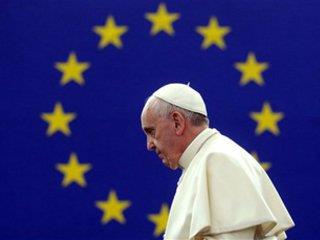When EP President Schulz invited the Pope to visit the Parliament, he probably forgot that the new Pope isn’t a European

The speech, given in Italian, drew strong applause from the European Parliament. But did all MEP’s understand what the Pope tried to make clear? I am afraid not.
by
N. Peter Kramer
Pope Francis is Argentinian and is looking at the European Union not as an insider like his German and Polish predecessors but from a clear distance. His conclusions were quite undiplomatic and harsh. The Pope denounced the European institutions for a ‘rather selfish lifestyle marked by an opulence that is no longer sustainable and which is frequently indifferent to the world around’.
‘In many quarters we encounter a general impression of weariness and ageing of a Europe that is now a ‘grandmother’, no longer fertile and vibrant; as a result, the great ideas that once inspired Europe seem to have lost their attraction and to be replaced by the bureaucratic technicalities of its institutions’, the Pope continued. Schultz and Commission President Juncker looked more and more uncomfortable whilst listening. But Pope Francis had more grist to the mill. Europe is forcing ‘a conception of unity seen as uniformity that strikes at … the democratic system’, he said. ‘The true strength of our democracies –understood as expressions of the political will of the people – must not be allowed to collapse under the pressure of multinational interests that are not universal, which weaken them into uniform systems of economic powers at the service of unseen empires’.
The speech, given in Italian, drew strong applause from the European Parliament. But did all MEP’s understand what the Pope tried to make clear? I am afraid not. Two days later a majority of MEP’s voted in favour of Commission President Juncker. Who was at the same time co-architect of the Eurozone austerity policies that caused huge unemployment and the growth of anti-Europe parties; and creator of a tax heaven in his Duchy for hundreds of big companies and rich families to avoid paying taxes in countries that had to cut spending and to raise tax on ordinary people.







